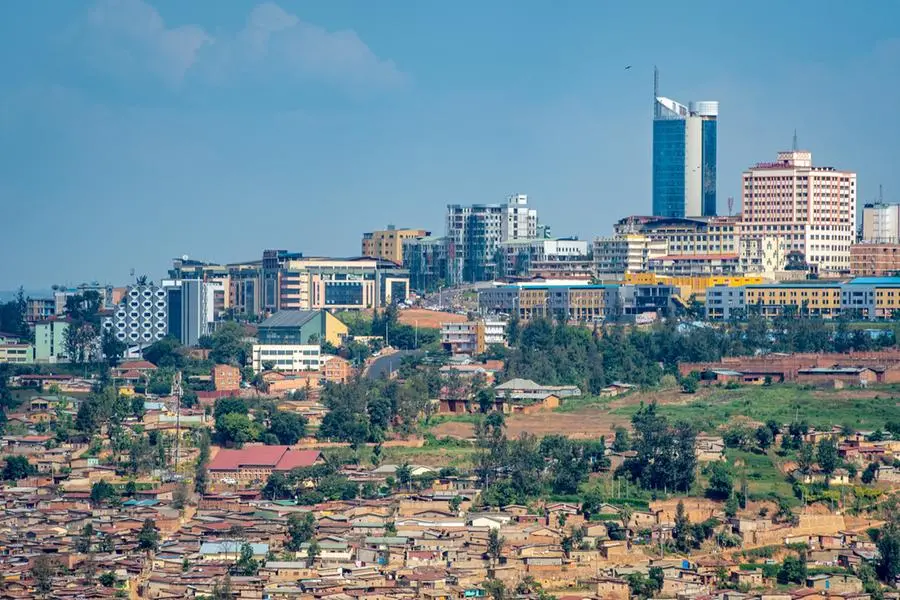PHOTO
The new $2 billion airport at Bugesera is an ambitious project to turn Rwanda into a regional aviation hub, but the International Monetary Fund (IMF) warns that its cost will add to the country’s public debt.
After selling a 60 percent stake in the airport to Qatar, the two shareholders had to find up to $2 billion, which is the revised cost of completing the airport, expected in 2026.
Rwanda's direct financial contribution to the project remains unclear, but with a 40 percent stake would amount to $800 million.
Kigali is expected to raise this money through external borrowing, which the IMF warns will increase the country’s debt. “Despite critical reform to enhance domestic revenue mobilisation, the cost of the planned Bugesera airport construction will significantly intensify debt service pressures and raise public debt to 86.3 percent of GDP in 2026,” the IMF said.
Although Rwanda has heeded the IMF’s recommendations by introducing a raft of taxes this year, in a bid to raise domestic resources and minimise reliance on foreign loans, it will need to fully implement the newly adopted tax measures while containing fiscal spending.“To mitigate debt vulnerabilities and rebuild the much-needed policy space to react to shocks, the authorities will need to ensure the full and timely implementation of the newly adopted tax measures, contain fiscal spending through careful reprioritisation of investment projects, and continue to strengthen their capacity to mitigate fiscal risks from state-owned enterprises and public-private partnerships,” the Fund added.
While Rwanda's economy remains strong and resilient, it faces increasing macroeconomic pressures.
Kigali will need to continue with “credible fiscal consolidation, strong domestic revenue mobilisation, data-driven monetary policy and exchange rate adjustment to reduce vulnerabilities, maintain low inflation, focusing on climate resilience through developing bankable climate projects and mitigate debt pressures.”“Risks of overruns on large infrastructure projects need to be vigilantly monitored,” IMF said.
The government expects the debt-to-GDP ratio to hit 80 percent by the end of 2025, but experts say it could be higher, given the recent sanctions and aid cuts the country has suffered in the wake of the M23 rebellion in neighbouring Congo.
Read: IMF board to decide on Rwanda’s $184.9m fresh funding in DecemberCredit rating agencies Moody’s and Fitch recently revised Rwanda's credit outlook from stable to negative, citing the risks posed by the ongoing conflict in the eastern Congo.“The adjustment to a negative outlook is a reflection of the risks to Rwanda’s credit profile due to the ongoing conflict in the eastern provinces of the Democratic Republic of Congo (DRC),” said Moody’s.
Fitch noted that grants constitute a significant source of government revenue for Rwanda, averaging 4.5 percent of GDP in 2023 and 2024, and estimates external loan commitments from bilateral and multilateral sources at about $1 billion per year (close to seven percent of GDP) in 2025 and 2026.
Foreign official sector borrowing is Rwanda's main source of government and external financing. But 88 percent of the government's external debt consists of concessional credit, deemed expensive to repay.
Grants and concessional project loans also finance a significant portion of Rwanda's public capital expenditure (average 10 percent of GDP in 2023 and 2024), a key driver of the country's economic growth.
Fitch said government debt increased to 77.8 percent of GDP in 2024 (from 72.8 percent in 2023), driven by the wide fiscal deficit, exchange rate depreciation as 80 percent of the debt stock is denominated in foreign currency, and the build-up of deposits, which rose to 10.8 percent of GDP.“Fitch expects debt/GDP to stabilise at around 81 percent through 2026, reflecting the still wide fiscal deficits and liabilities from the construction of Bugesera airport. This is well above the 54 percent of GDP we forecast for the 'B' median in 2026.”
© Copyright 2022 Nation Media Group. All Rights Reserved. Provided by SyndiGate Media Inc. (Syndigate.info).




















